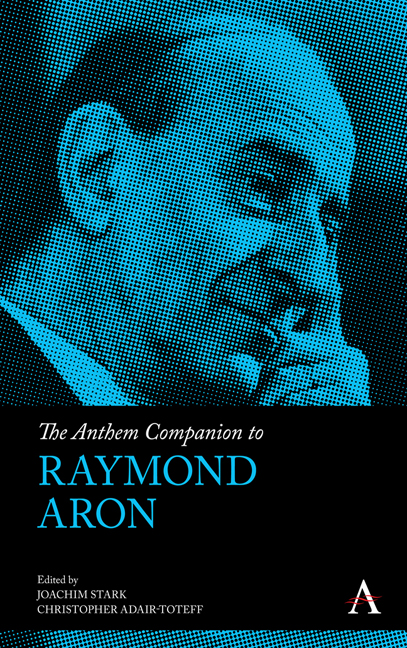Book contents
- Frontmatter
- Contents
- Acknowledgements
- Introduction: Retracing Aron’s Routes to Sociology
- Chapter One The Subject, Pluralism and Équité: Raymond Aron and Sociology
- Chapter Two Aron, Weber and Nationalism
- Chapter Three Equivocal and Inexhaustible: Aron, Marx and Marxism
- Chapter Four The Opium of the Intellectuals
- Chapter Five A New Era in the Human Adventure: Industrial Society and Economic Growth
- Chapter Six Raymond Aron: La lutte de classes
- Chapter Seven Political Philosophy Meets Political Sociology: Raymond Aron on Democracy and Totalitarianism
- Chapter Eight The Contradictions of Prometheus: Wisdom and Action after the Disillusionment of Progress
- Chapter Nine The International Problem and the Question of the Best Political Regime
- Chapter Ten War and Irrationality: Aron and Pareto
- Conclusion: Aron on Liberty
- Notes on Contributors
- Index
Introduction: Retracing Aron’s Routes to Sociology
Published online by Cambridge University Press: 22 February 2022
- Frontmatter
- Contents
- Acknowledgements
- Introduction: Retracing Aron’s Routes to Sociology
- Chapter One The Subject, Pluralism and Équité: Raymond Aron and Sociology
- Chapter Two Aron, Weber and Nationalism
- Chapter Three Equivocal and Inexhaustible: Aron, Marx and Marxism
- Chapter Four The Opium of the Intellectuals
- Chapter Five A New Era in the Human Adventure: Industrial Society and Economic Growth
- Chapter Six Raymond Aron: La lutte de classes
- Chapter Seven Political Philosophy Meets Political Sociology: Raymond Aron on Democracy and Totalitarianism
- Chapter Eight The Contradictions of Prometheus: Wisdom and Action after the Disillusionment of Progress
- Chapter Nine The International Problem and the Question of the Best Political Regime
- Chapter Ten War and Irrationality: Aron and Pareto
- Conclusion: Aron on Liberty
- Notes on Contributors
- Index
Summary
Raymond Aron is an exceptional figure among twentieth-century sociological and political thinkers. His endeavor to enrich the social sciences with a comprehensive, encompassing examination of human life in society may even qualify him as an author of the century in which he worked, on a par, for instance, with Emile Durkheim and Max Weber. Ralf Dahrendorf, a sociologist with intellectual roots in both the German and Anglo-American contexts, once said of him:
Great men must possess a high degree of that basic human quality: individuality. Nevertheless, let me say this: Raymond Aron is the only social scientist of recent decades who, in view of his wide sphere of interest, his combination of analysis and action, commitment and power of understanding, his blend of critical revolt and critical reserve, may be compared in terms of significance with Max Weber. (Dahrendorf 1980, 30; see also Hübinger 2019, 365–67)
The sociologist Edward Shils concurs: “I think that no academic of this century—certainly no academic social scientist, with the possible exception of John Maynard Keynes—was so widely known and appreciated as Raymond Aron” (Shils 1985, 4). While renowned universities across the globe invited him to hold guest lectures or conferred honorary doctorates upon him, his fame transcended the academic sphere, with leading policymakers in France and the United States turning to him for analysis of foreign policy and matters of national security.
His work is without doubt a shining beacon amid the hazardous cliffs and treacherous depths of the modern history of ideas and social thought, particularly with regard to the twentieth century. His oeuvre's luminosity stems in part from its sheer size and diversity, yet also, and indubitably, from the lifelong mission pursued by its author, the task of understanding his age both in its grand-scale political and socioeconomic traits and in the complex social ramifications of its day-to-day life. Throughout this, Aron remained consistently dedicated to the ideals of truth and reason while never losing sight of the limits of the human capacity for knowledge. His singularity arises from the decisive approach he took towards specific issues, but without actually identifying himself with political parties or ideologies.
- Type
- Chapter
- Information
- The Anthem Companion to Raymond Aron , pp. 1 - 18Publisher: Anthem PressPrint publication year: 2021

